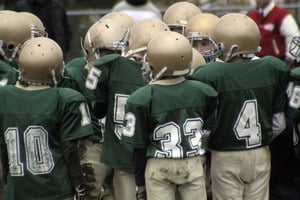The popularity of the National Football League (NFL) and collegiate football has inspired parents nationwide to sign their kids up for youth football. Having three sons who have played, I have seen that youth football is a fantastic sport for many kids.
But I’ve also learned several things that parents should consider before signing their kids up for youth football. I hope these tips will help you make a wise decision about whether youth football is appropriate for your child.
1. Football is not for every child or parent:
Football by its very nature is a physically demanding and violent sport. This means that even at the 7-, 8-, and 9-year-old level, there will be intense workouts that focus on getting the kids in shape to play football. These workouts will include drills on how to tackle and block. No matter what position your child ends up playing, he will be hitting and will get hit.
The hitting simply is not for every kid or parent. Having some apprehension about being hit or hitting other kids is normal, but some kids are simply terrified of it and cannot do it. Do both your child and yourself a favor and consider this before signing up for youth football. Forcing a child to play when he can’t hit or be hit could get him hurt.
You also need to consider whether you will be able to watch your child get hit and hit others during many weeks of practices and then in 8 to 10 football games a year. Of course, here again, some apprehension is normal, but it should be apprehension that you can control and tolerate!
2. There will be injuries:
The helmets, shoulder pads, mouthpieces, and other protective equipment used in youth football today is absolutely fantastic. But injuries do occur. The vast majority of injuries are minor such as bruises, bumps, muscle strains, etc.
But, while rare, occasionally the injuries are more severe, including the possibility of concussions and very rarely severe life altering injuries. While coaches and officials do everything in their power to ensure that the kids are protected, when you sign your child up for youth football you need to understand that injuries are possible, that kids often play hurt with minor injuries, and you have to be able to live with the reality that your child could be hurt playing football.
3. Playing football is a huge commitment for both child and parent:
Parents and kids are often shocked at the commitment required for youth football. There will be 3-4 practices a week that will last two hours or more each. These practices are in addition to weekly games. This cuts into the time available for many other activities. In particular, it makes it challenging to get homework done for school.
In addition, youth football organizations are typically volunteer non-profit organizations. This means that the only way they run properly is through the efforts of volunteers, mostly parents. Some organizations will have a minimum required volunteer commitment by parents. Some organizations even say that if a parent fails to meet this obligations their child can be excluded from playing. You can also anticipate regular fund raising, as quality football equipment is not cheap.
Before you sign your child up to play youth football, make sure you both understand what your commitment is and have a plan for how you will meet your obligations.
4. Youth football is meant to be fun:
Youth football is supposed to be a fun recreational activity where all kids, regardless of ability, should be able to participate. Remember that the coaches and referees are typically volunteers or receive only a small stipend. It is highly unlikely that anyone is a professional football coach or referee. Mistakes will happen. Sometimes it is frustrating when the team isn’t winning or you do not believe your child is getting enough playing time. Before you let that frustration show, take a deep breath and remember that the kids having fun is the ultimate goal of youth football.
Of course, nothing is perfect and there are occasionally problems with coaches that do need to be addressed. The sideline during a game or at practice is not, absent a serious safety concern, the time to handle problems. Instead, first try quietly and professionally discussing the issue with the coach away from the kids. If that does not resolve the issue, then approach your club’s officials regarding the issue, and, then if all else fails, contact league officials. Remember to always be professional and courteous.
Hopefully, these tips will make it easier for you to decide whether or not youth football is appropriate for you and your child.
